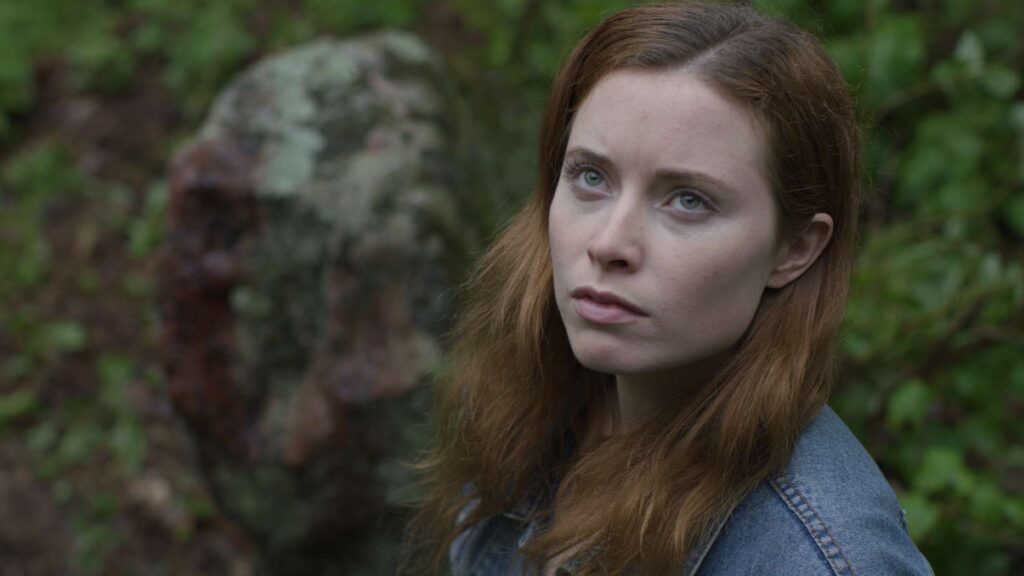Suspenseful twists, stereotypical psychopathy, and the normalization of queer relationships are central to the psychological thriller What Keeps You Alive (2018).
Jules (Brittany Allen) and Jackie (Hannah Anderson), a young married couple, head to Jackie’s family’s remote cabin in the woods by a large lake to celebrate their first anniversary. Once they arrive, Jules begins to learn unsettling details about her wife that point to something deeply sinister within Jackie’s nature. It sounds like a pretty generic plot for psychological horror, and it is. What makes this movie so exciting is its progressive portrayal of its LGBTQIA+ characters.
Horror films with queer characters are few and far between, let alone queer protagonists. That’s one element of What Keeps You Alive that makes this psychological thriller unique and compelling. Not only are the main characters in a lesbian relationship, but the most refreshing part is that there’s no specific plot reason why these two women are gay.
As the film progresses, Jules meets Sarah (Martha MacIsaac), Jackie’s childhood friend, where she learns that Jackie’s birth name is Megan, and that she had a best friend who drowned in the lake when she was a kid. Jules is upset, but Jackie regains her good graces by showering her with compliments, giving her gifts, and using emotional manipulation to explain why she never told Jules key details about her life.
The best part of the movie is when everything suddenly changes in a moment. Jules and Jackie go on a hike up to a beautiful cliff overlooking the wilderness. Jules stands close to the edge, gazing at the wonderful view, when Jackie suddenly lets out a battle cry, runs forward, and shoves Jules over the edge of the cliff with all her might.
After that moment, Jackie changes completely. She calmly heads back to the house, practicing her pretend anguish for the 911 call. But when she returns to the cliff, Jules isn’t there. She survived and dragged her maimed body into the woods to hide from her wife.
As you can see, the movie would be pretty much the same plot-wise if one of the main characters were swapped out with a man, which is exciting because typically, queer characters are only seen in media when there’s an explicit reason why they need to be queer to make the story work. Instead, What Keeps You Alive’s protagonists’ sexualities are hardly relevant.
Jackie’s sexuality comes up as an excuse for changing her name from Megan, but that’s about it. The fact that Jules and Jackie are lesbians is not the film’s central focus, and that in itself is a breath of fresh air.
Instead, the movie centers around the fear that we can never truly know what’s going on in someone else’s head. It’s focused on the fear that those we love can hurt us the most. It’s brimming with suspense from the moment Jackie shoves Jules off the cliff. Jules hides in the woods as she slowly discovers the extent of Jackie’s psychopathy. Eventually, she manages to make it back to the house, but Jackie catches up with her when she takes a rowboat across the lake in an attempt to escape to Sarah’s house. Jackie’s disturbing behaviors continue to escalate, leaving the audience wondering just how far she’ll take it to murder Jules.
The one issue I have with What Keeps You Alive is Jackie’s characterization as a psychopath. All the stereotypical tropes of a psychopath are in there: Jackie’s innate ability to lie, her assertion that nature rather than nurture made her this way, and the reveal that this isn’t her first kill. Jackie’s character could have been much more compelling if the writers had chosen to push against some of those overdone tropes.
Lastly, I want to talk about the ending. It’s tragic, but righteous. It’s extremely well done, and I didn’t see it coming at all. It’s worth the watch, so I won’t spoil it for you.
What Keeps You Alive is an excellent horror film because of the level of suspense in the story, the incredible performance of both lead actors, and how sexuality is handled in the story. The two protagonists are queer simply because that’s how life works: some people are lesbians, and their whole lives aren’t about being queer. Shocker, huh?
